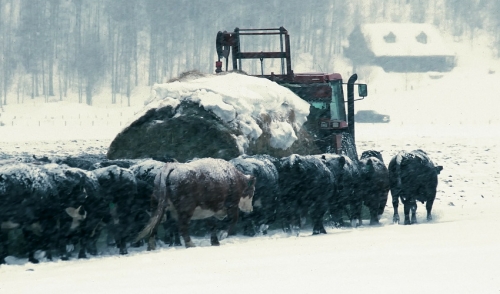
How Do Farmers Take Care of Their Cattle During Winter Storms & Cold Weather?
Winter storms and cold weather are hard on all of us. This means just as we humans feel the frigid, icy air, so do your cattle and livestock. It’s easy to bring your pets indoors when there is a storm outside, but you can’t fit the whole herd in your living room. As you prepare for the cold weather that lies ahead, here are some important cattle management tips to follow to protect your herd from dangerous temperatures.
The first tip to taking care of your cattle during winter storms and cold weather is to increase the quality of feed you are giving to your cattle to support their daily energy requirements. Energy requirements for cattle increase during the winter as more energy is required to stay fit and warm. On average, the energy requirements for cattle increase by two percent for every degree drop in the wind chill temperature. This equates to a lot of energy being used during the colder months just to stay warm and healthy. This energy can be restored by adding high quality grains or additional roughage into the cattle’s diet. Quality roughage can be tough to find this time of year, therefore be sure to use grains such as corn, barley, wheat, and oats. In addition to adding more to the diet of your cattle, another tip is to employ a feeding method that allows for each cow to eat its share of the rations. Be mindful of how much each cow is eating and their condition so that no one is left out and everyone gets the fill they need to stay healthy. If you have any animals that are pregnant, set up a separate feeding process for the group so that the cattle can maintain themselves, continue to grow, and grow a fetus for the future of the herd.
Another tip to taking care of your cattle is to make sure there is plenty of clean water available for consumption. Often times, novice owners will assume the cattle can meet their water requirements by eating or licking the snow. This is not true. Ensuring adequate water intake for your cattle will help maintain their overall health and performance. Providing your livestock with clean water on a consistent basis will also prevent serious conditions such as coli and impaction. The last important tip to follow is to manage the environment in which the cattle live and provide adequate shelter. Shelter is an obvious concern, but space and conditions of barns are often overlooked. Keep sufficient space in your barn so that all animals have room and keep the beds and floor of the space as dry as possible. You want to manage the mud where your cattle congregate the most to prevent disease and illness from spreading across your herd. Often times, mud is caused by overcrowding so make sure there is enough space or find an alternative to add more shelter for your animals. If you have a large party of cattle, then it’s more important to make sure their diet is taken care of as adequate shelter just may not be an option.
Feel free to use blankets for those cattle that may be older, but as long as your cattle are getting enough feed and water to meet their energy requirements, they will have no problem making it through the winter. Failure to support your cattle during the winter can result in stunted animals, decrease in milk production, and even worse, dead fetuses. Feed your cattle, give them water frequently, and monitor their body conditions so that your cows remain happy and healthy during the winter.
